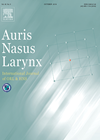
Journal Reviews
Cochlear implants in the over 80s
The UK has an ageing population. Seven percent of the over 80s population have bilateral severe to profound hearing loss which can lead to associated negative outcomes (social isolation, depression and reduced quality of life). Cochlear implantation (CI) can successfully...
Long-term curative effects of microvascular decompression for hemifacial spasm
This article describes results of a multicentre prospective trial performed to evaluate long- and short-term outcomes and complications of patients who underwent microvascular decompression (MVD) for hemifacial spasm (HFS). The surgeries were performed by surgeons with more than 15 years...
Satisfaction levels in elderly patients with cochlear implants
Hearing rehabilitation in the elderly is of utmost importance as it is associated with depression and dementia in this age group. Cochlear implantation is indicated for hearing-impaired individuals who do not derive adequate benefit from conventional hearing aids. In this...
Does minimally invasive surgery under local anaesthesia have a role in the management of chronic rhinusinusitis?
A formal FESS procedure usually done under local anaesthesia is considered as gold standard in the management of chronic rhinusinusitis. However, success is hampered by a significant recurrence rate of polyps requiring revision surgery, long waiting lists, reluctance of elderly...
Which graft is better for type 1 tympanoplasty in elderly patients?
Type 1 tympanoplasty is a procedure performed to repair tympanic membrane perforations, primarily to reduce otorrhoea. This may subsequently lead to improvement of hearing. The common graft materials used are temporalis fascia and cartilage from tragus or concha. The authors...










